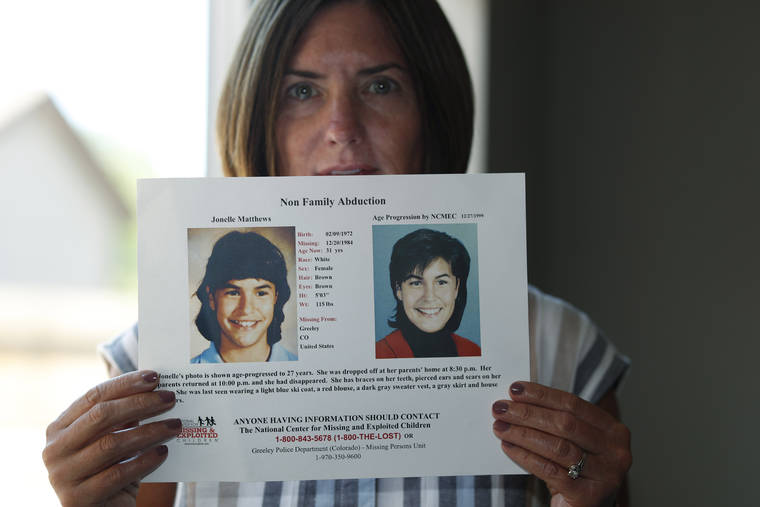GREELEY, Colo. — For more than 30 years, Jonelle Matthews’ family could only wonder what had happened to the 12-year-old girl whose disappearance attracted the attention of the White House and shocked a rural Colorado community.
They have faced false alarms over the years whenever human remains were found or police interviewed someone new for information about Jonelle. In July, they finally learned what happened to their daughter and sister — a construction crew discovered her remains, and police officially labeled her death a homicide.
But they still don’t know who killed her. Finding her body ended one chapter of the family’s life and opened another, said Jennifer Mogensen, Jonelle’s older sister.
“Somebody is responsible for doing this to her,” Mogensen told The Associated Press this week.
After singing in a holiday concert at her middle school on Dec. 20, 1984, Jonelle was taken home by a friend and the friend’s father. She was last seen at 8 p.m., entering the ranch-style home where she lived with her father, Jim; mother, Gloria; and sister.
Their father arrived home from Jennifer’s basketball game about an hour after Jonelle but found an empty house, The Greeley Tribune reported. Their mother had left earlier that day to visit family in another state, Mogensen said.
Despite an intense search that started that night, no one was ever arrested. Jonelle’s disappearance was among the cases highlighted by then-President Ronald Reagan as his administration launched a national effort to find missing children.
Police have declined to comment on the case or any potential suspects since Jonelle’s remains were found last month by workers digging a pipeline in a rural area southeast of Greeley, a city about 50 miles (80 kilometers) north of Denver.
It marked the most significant development in the case in decades. Mogensen described the discovery as “a miracle” because it depended on the pipeline’s location.
“If it would have been dug one foot to the left or to the right, she would not have been found,” Mogensen said.
The family returned to Greeley this week to make plans for Jonelle’s burial and attend a community celebration of the girl’s life. Mogensen, who was a junior in high school when her sister disappeared, now lives in Washington state. Their parents have retired in Costa Rica.
Mogensen said she and her parents have provided DNA samples to investigators. Their parents adopted Jonelle when she was an infant, and police also have DNA from her biological mother, Mogensen said.
She describes her sister as strong and fiercely independent, and family photos show that spunk.
In one shot, Jonelle stands in the family’s home, playing to the camera with a hand on her hip. In another, she stares directly into the lens with her mouth set and eyes slightly narrowed. In countless others, her grin is wide and unguarded.
The family held a memorial service on the 10th anniversary of Jonelle’s disappearance, seeking an opportunity to say goodbye and let the city move on. But until July, Mogensen could not be entirely certain that her dark-haired sister was dead.
She now hopes the killer is still alive and can be tracked down using DNA technology that has advanced far beyond what investigators had in previous decades.
“This is meant to happen,” she said. “And if there’s any DNA … it’s showtime.”
———
Associated Press writers James Anderson and P. Solomon Banda contributed to this story.




